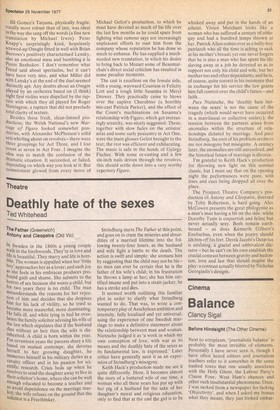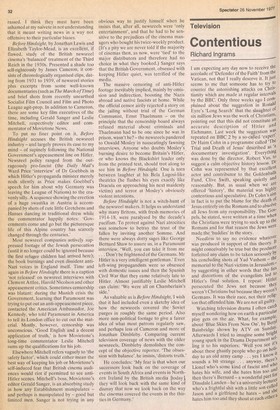Cinema
Balance
Clancy &gal
Before Hindsight (The Other Cinema) Next to ectoplasm, 'journalistic balance' is probably the most invisible of elements. Personally I have never seen it, though I have often heard editors and journalism teachers refer to it somewhat in the same hushed tones that one usually associates with the Holy Ghost, the Labour Party's Clause Four, West Ham's chances and other such insubstantial phenomena. Once, I was sacked from a newspaper for lacking 'Objectivity', and when I asked my bosses what they meant, they just looked embar rassed. I think they must have been ashamed at my naivete in not understanding that it meant writing news in a waY not offensive to their particular biases.
Before Hindsight, by Jonathan Lewis and Elizabeth Taylor-Mead, is an excellent, if flawed, study of the British newsreel cinema's 'balanced' treatment of the Third Reich in the 1930s. Presented a shade too self-righteously by James Cameron, it consists of chronologically organised clips, dating from 1931 to 1939, of newsreel stories plus excerpts from some well-known documentaries (such as The March of Time) and brief shots from recently unearthed Socialist Film Council and Film and Photo League agit-prop. In addition to Cameron, there are some key film executives of the time, including Gerald Sanger and Leslie Mitchell, respectively editor and commentator of Movietone News.
To put no finer point on it, Before Hindsight accuses the British newsreel industry and largely proves its case to my mind of supinely following the National Government's appeasement line on Hitler. Newsreel policy ranged from the outrageously pro-fascist (the Daily Mail's Ward Price 'interview' of Dr Goebbels in which Hitler's propaganda minister merely nods silently as Price makes Goebbel's speech for him about why Germany was leaving the League of Nations) to the cravenly silly. A sequence showing the erection of a huge swastika in Austria is accompanied by shots of cute little Gretchens and Hanses dancing in traditional dress while the commentator happily notes: 'Governments come and go but the picturesque life of this Alpine country has scarcely changed through the centuries.'
Most newsreel companies actively suppressed footage of the Jewish persecution (until it no longer could be ignored because the first refugee children had arrived here); the book burnings and even dissident antiNazi voices in England itself. Time and again in Before Hindsight there is a caption 'not released' on newsreel interviews with Clement Attlee, Harold Nicolson and other appeasement critics. Sometimes censorship was blatant: during the Munich crisis the Government, learning that Paramount was trying to put out an anti-appeasement piece, contacted the American Ambassador, Joe Kennedy, who told Paramount in America to tell its London office to cut out the mat erial. Mostly, however, censorship was unconscious. 'Good English and a decent application of truth,' is how Movietone's long-iime commentator Leslie Mitchell sums up the qualifications for his job.
Elsewhere Mitchell refers vaguely to 'the safety factor', which could either mean the best way of keeping his job or Movietone's self-induced fear that British cinema audiences would riot if permitted to see anti Hitler scenes. Mitchell's boss, Movietone's editor Gerald Sanger, is an absorbing study in how any Establishment manipulates and perhaps is manipulated by good but limited men. Sanger is not trying in any obvious way to justify himself when he insists that, after all, newsreels were 'only entertainment', and that he had to be sen sitive to the prejudices of the cinema managers who bought his twice-weekly product.
(It's a pity we are never told if the majority of cinemas then, as now, were 'tied' to the major distributors and therefore had no choice in what they booked.) Sanger says that the British Governnient, obsessed with keeping Hitler quiet, was terrified of the media.
The massive censoring of anti-Hitler footage inevitably implied, mainly by omis sion and indirection, boosting the Nazis abroad and native fascists at home. While the official censor airily rejected a story on the jailing without trial of the German Communist, Ernst Thaelmann on the principle that the censorship board always refused material about criminals and Thaelmann had to be one since he was in prison, wasn't he? the newsreels pandered to Oswald Mosley in nauseatingly fawning interviews. Anyone who doubts Mosley's .
burning desire to become Britain's Hitler, or who knows the Blackshirt leader only from the printed text, should trot along to see him in Before Hindsight. One is torn between laughter at his Bela Lugosi-like theatrics (he flashes his eyes exactly like Dracula on approaching his next maidenly victim) and terror at Mosley's obviously violent intentions.
Before Hindsight is not a witch-hunt of the newsreel makers. It helps us understand why many Britons, with fresh memories of 1914-18, were paralysed by the decade's pacifism. To protest against Nazi atrocities was somehow to betray the trust of the fallen by inviting another Somme. And there were always dotty sages like George Bernard Shaw to assure us, in a Paramount interview, 'Well, you can take it from me . . Don't be frightened of the Germans. Mr Hitler is a very intelligent gentleman.' Even left-wing propagandists were so obsessed with domestic issues and then the Spanish Civil War that they came relatively late to Hitler. Almost justifiably Leslie Mitchell can claim: 'We were all on Chamberlain's side.'
As valuable as is Before Hindsight, I wish that it had included even a sketchy idea of how the newsreels covered the • Soviet purges in roughly the same period. Also more non-political footage to give a fairer idea of what most patrons regularly saw, and perhaps less of Cameron and more of Jonathan Dimbleby. Comparing current television coverage of news with the older newsreels, Dimbleby demolishes the concept of the objective reporter. 'The obsession with balance', he insists,`distorts truth.'
He concludes: 'My fear is that when our successors look back on the coverage of events in South Africa and events in Northern Ireland by the British media [today], they will look back with the same kind of dismay that now we look back on the way the cinemas covered the events in the thirties in Germany.'







































 Previous page
Previous page